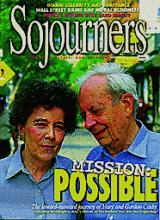The news is nothing but good on Wall Street, where life continues to be one wild, exciting ride. High-flying financiers fly a little higher with each surge of the Dow. Its periodic dips evoke gasps and muffled screams from market watchers, but the canny investor seizes the opportunity to cherry-pick new holdings at bargain prices and wait for the market's momentum to carry things upward again.
CEOs, eager to appease profit-hungry stockholders, cut costs by shifting production offshore. At home, payrolls are trimmed and workforces downsized. The number of costly, benefit-laden full-time jobs decrease, replaced by armies of part-timers and contract workers. Grateful corporations reward their hatchet men and women with huge bonuses. And more stock.
Speaking in the voice of what passes for God on Wall Street, Federal Reserve Chairman Alan Greenspan pronounces himself pleased by reports that unemployment is up, thereby keeping inflation at bay and interest rates steady. Duly inspired, investors become ever more confident and indexes soar again. The bond market goes through the roof.
On other streets, the ride is equally wild, but far less lucrative.
Prosperity was not enough to prevent Congress and President Clinton from dismantling the welfare system and passing responsibility on to the states. Now, driven by varying timetables and social philosophies, governors and state legislators are dutifully unraveling the already inadequate safety nets that sought to give the poor, the old, the weak, and the vulnerable a modicum of protection.
Chanting the mantra of "welfare to work," Clinton has traveled the nation, celebrating the paper gains of welfare reduction programs and ignoring the human toll. Two thousand, 5,000, 10,000 people gone from the welfare rolls, the president exulted in his travels from state to state.
Read the Full Article
